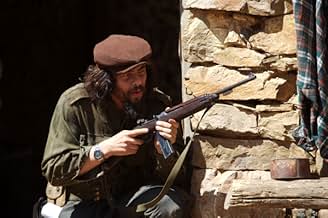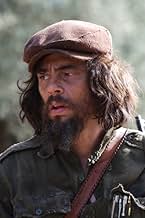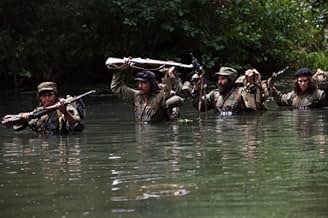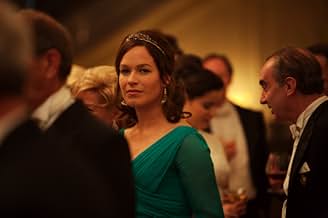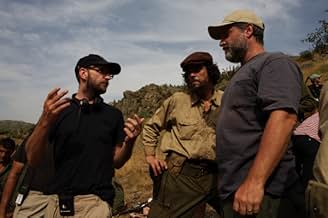Dopo la rivoluzione cubana, il Che è all'apice della sua fama e del suo potere. Poi improvvisamente sparisce, e ricompare in incognito in Bolivia, dove organizza un piccolo gruppo di compagn... Leggi tuttoDopo la rivoluzione cubana, il Che è all'apice della sua fama e del suo potere. Poi improvvisamente sparisce, e ricompare in incognito in Bolivia, dove organizza un piccolo gruppo di compagni cubani e reclute boliviane destinati a dare inizio alla grande rivoluzione latino-americ... Leggi tuttoDopo la rivoluzione cubana, il Che è all'apice della sua fama e del suo potere. Poi improvvisamente sparisce, e ricompare in incognito in Bolivia, dove organizza un piccolo gruppo di compagni cubani e reclute boliviane destinati a dare inizio alla grande rivoluzione latino-americana.
- Regia
- Sceneggiatura
- Star
- Premi
- 2 vittorie e 7 candidature totali
- Fidel Castro
- (as Demian Bichir)
Recensioni in evidenza
If you are patient enough to sit through the over four hours, with an intermission between the two sections, there are rewards. There's an authentic feel throughout--fortunately Soderbergh made the decision to film in Spanish (though some of the actors, oddly enough in the English segments especially, are wooden). You get a good outline of what guerrilla warfare, Che style, was like: the teaching, the recruitment of campesinos, the morality, the discipline, the hardship, and the fighting--as well as Che's gradual morphing from company doctor to full-fledged military leader. Use of a new 9-pound 35 mm-quality RED "digital high performance cine camera" that just became available in time for filming enabled DP Peter Andrews and his crew to produce images that are a bit cold, but at times still sing, and are always sharp and smooth.
The film is in two parts--Soderbergh is calling them two "films," and the plan is to release them commercially as such. First is 'The Argentine,' depicting Che's leadership in jungle and town fighting that led up to the fall of Havana in the late 50's, and the second is 'Guerrilla,' and concerns Che's failed effort nearly a decade later in Bolivia to spearhead a revolution, a fruitful mission that led to Guevara's capture and execution in 1967. The second part was to have been the original film and was written first and, I think, shot first. Producer Laura Bickford says that part two is more of a thriller, while part one is more of an action film with big battle scenes. Yes, but both parts have a lot in common--too much--since both spend a large part of their time following the guerrillas through rough country. Guerrilla an unmitigated downer since the Bolivian revolt was doomed from the start. The group of Cubans who tried to lead it didn't get a friendly reception from the Bolivian campesinos, who suspected foreigners, and thought of the Cuban communists as godless rapists. There is a third part, a kind of celebratory black and white interval made up of Che's speech at the United Nations in 1964 and interviews with him at that time, but that is inter-cut in the first segment. The first part also has Fidel and is considerably more upbeat, leading as it does to the victory in Santa Clara in 1959 that led to the fall of the dictatorship of Fulgencio Batista in Cuba.
During 'Guerilla' I kept thinking how this could indeed work as a quality European-style miniseries, which might begin with a shortened version of Walter Salles's 'Motorcycle Diaries' and go on to take us to Guevara's fateful meeting with Fidel in Mexico and enlistment in the 26th of July Movement. There could be much more about his extensive travels and diplomatic missions. This is far from a complete picture of the man, his childhood interest in chess, his lifelong interest in poetry, the books he wrote; even his international fame is only touched on. And what about his harsh, cruel side? Really what Soderbergh is most interested in isn't Che, but revolution, and guerrilla warfare. The lasting impression that the 4+ hours leave is of slogging through woods and jungle with wounded and sick men and women and idealistic dedication to a the cause of ending the tyranny of the rich. Someone mentioned being reminded of Terrence Malick's 'The Tin Red Line,' and yes, the meandering, episodic battle approach is similar; but 'The Thin Red Line' has stronger characters (hardly anybody emerges forcefully besides Che), and it's a really good film. This is an impressive, but unfinished and ill-fated, effort.
This 8-years-gestating, heavily researched labor of love (how many more Ocean's must come to pay for it?) is a vanity project, too long for a regular theatrical release and too short for a miniseries. Radical editing--or major expansion--would have made it into something more successful, and as it is it's a long slog, especially in the second half.
It's clear that this slogging could have been trimmed down, though it's not so clear what form the resulting film would have taken--but with a little bit of luck it might have been quite a good one.
As it goes, the second part of Che is sadder, but in some ways wiser than the first part. Which makes sense, as Guevara has to endure low morale from his men, betrayals from those around him, constant mistakes by grunts and nearby peasants, and by ultimately the enclosing, larger military force. But what's sadder still is that Guevara, no matter what, won't give in. One may see this as an incredible strength or a fatal flaw- maybe both- but it's also clear how one starts to see Che, if not totally more fully rounded, then as something of a more sympathetic character. True, he did kill, and executed, and felt justified all the way. And yet it starts to work on the viewer in the sense of a primal level of pity; the sequence where Guevara's health worsens without medicine, leading up to the shocking stabbing of a horse, marks as one of the most memorable and satisfying of any film this year.
Again, Soderbergh's command of narrative is strong, if, on occasion, slightly sluggish (understandable due to the big running time), and one or two scenes just feel totally odd (Matt Damon?), but these are minor liabilities. Going this time for the straight color camera approach, this is almost like a pure militia-style war picture, told with a great deal of care for the men in the group, as well as Guevara as the Lord-over this group, and how things dwindle down the final scene. And as always, Del-Toro is at the top of his game, in every scene, every beat knowing this guy so well- for better and for worse- that he comes about as close to embodiment as possible. Overall, the two parts of Che make up an impressive package: history as drama in compelling style, good for an audience even if they don't know Che or, better, if they don't think highly of him. It's that special. 8.5/10
It has some of the strengths of the first film: the cinematography and direction of Steven Soderbergh, which give the whole work a lifelike, almost documentary feel, and the superb acting of Benicio del Toro who - even more than before - is rarely off the screen. However, the narrative is less compelling this time with the guerrillas seemingly going from one place to another with no obvious strategy. The main criticism of both parts though is that we have over four hours of excessively reverential treatment of an immensely controversial figure with little acknowledgement of the egotism that was at the heart of the doomed Bolivian mission.
While the movie's tone in some regards does stray off and differ quite drastically from Part One however, there still remains that same documented approach taken a month ago that avoids melodrama and fabrication as much as possible. This somewhat distant, cold approach to telling Che's story and struggle will no doubt turn some viewers off; indeed, I still remain reserved about whether or not the feature itself should have been named after one manif anything, the entirety of Che, taken as a whole, delivers a tale that goes beyond mere biography and instead documents a man's struggle alongside those who helped carry him along the way. By no means does Soderbergh try to paint a humanistic portrait here akin to what Hirschbiegel did with Der Untergang half a decade ago (excuse the ironic contrast); Che is a slow moving, reserved and meditative approach to telling a history lesson that just happens to be narrated by the one man who arguably- conducted the whole thing.
Yet by moving from the lush green landscapes of Cuba and retreating to the bleak, decaying backdrop of Bolivia for Part Two, the story does inevitably take on a distinctly contrasting tone that doesn't feel too disjointed from its predecessor, but does enough to give it its own reference points. Here, the basic structure of Part One is echoed backthere's the initial struggle, the battles, the fallen comrades and the recruiting of those to replace them, all the while we see some glimpses of the man behind the movement. Yet, as anyone with the vaguest idea of the actual history behind the feature will know, Part Two is destined to end on a much more underwhelming, and disquieting note. This difference, in combination with the similarities to Part One, make a compelling and memorable whole; by all means, both could be digested one their own (and kudos to Soderbergh for achieving as such) and enjoyed as they are, but taken as one statement, Che delivers exactly what it sets out to achieve.
Indeed, everything that made Part One the treat that it was one month prior is still evident here from the subtle yet engrossing performances from the central cast to the slow building, realistically structured combat scenesthe drama inherent to the characters on screen is just as vague and indiscernible, but with a feature such as this, Part Two once again proves that avoiding such elements don't necessarily hurt a film when there is enough plot and reflection on other elements to keep the viewer engaged. In fact, upon writing this review I was at odds as to whether or not to simply add a paragraph or two to my initial review for Part One, and title the review as a whole, yet I felt that to do so would only serve to disillusion those who may sit down to watch the entirety of both films consecutively.
With that said, I cannot rightfully decree whether or not Che holds up to the task of engaging an audience for its sprawling four hour plus runtime, but upon viewing both segments I can at least attest to each part's ability to do just that. With a reflective, intricate screenplay combined with endlessly mesmerising photography and nuanced performances that do justice to the movie's characters without drawing attention to themselves, Che Part Two is every bit as compelling and rewarding as its predecessor, but this time with a tragic but uplifting, reaffirming conclusion fit for the history pages of film.
- A review by Jamie Robert Ward (http://www.invocus.net)
James Rocchi, for instance, called it, a work of art that's, "not just the story of a revolutionary," but, "a revolution in and of itself." The Guardian's Peter Bradshaw called it a "flawed masterpiece." I return to my original contention for Part One that the value lies particularly in depiction of a hero figure. And in an age when there is a surfeit of poor hero role-models, could it not be salutary to see a strongly honourable one, even if stripped of some of the less endearing episodes of his life? This is the psychological hero enshrined by the great Scottish essayist, Thomas Carlyle, in his seminal book, Heroes and Hero Worship. Heroes can be real or imaginary (or somewhere in-between). But should genuinely inspire us to higher goals, a higher purpose. Compare this with the unrealistic 'heroes' of standard Western storytelling: where a person undergoes trials and tribulations before obtaining a barely-believable reward usually everlasting love or material wealth as if by divine studio intervention. Real heroes have an excess of moral courage not Lost Ark dare-devilishness or James Bond super-toys. They rise, and empower others to rise, to be the best that they can be. In Part One, Che succeeds. In Part Two, he fails. It is not for want of moral courage but since a) not all good plans can succeed and b) being human, mistakes are inevitable.
Guevara's intellectual clarity is flawed when he equates conditions that justify armed struggle with conditions that make that armed struggle able to succeed. It is a serious miscalculation.
High in the mountains from La Paz, the colours are breathtaking. There is an air of mise-en-scene authenticity that was occasionally lacking in Che - Part One (The U.S. would not allow Soderbergh to film in Cuba.) Visual treats are heightened by maximising natural light and the extreme flexibility and realism offered with groundbreaking RED cameras. This is a high performance digital cine camera with the quality of 35mm film and the convenience of pure digital. Designed for flexibility and functionality, the package weighs a mere 9 lbs. "Shooting with RED is like hearing the Beatles for the first time," says Soderbergh. "RED sees the way I see . . . so organic, so beautifully attuned to that most natural of phenomena light." If Che had stopped with the successful Cuban revolution it would have enshrouded him with an almost mystical invincibility. That he fails in Bolivia shows not only that he has human limitations but that it is his moral virtues that are remembered, not the political triumph. Critics will say and with some justification - that his armed struggle inspired much less noble characters to achieve tin-pot dictatorships. His development of guerrilla fighting tactics are not good or bad in themselves (and have since been used for both).
But for all its praiseworthiness, the film often seems to lack dramatic and narrative tension. We stumble from one escapade to another, knowing that he will eventually meet his death. I found myself glancing at my watch and thinking it could have been shorter. But the work that has gone into this interviews with people from all sides and even getting one of Guevara's ex-comrades to coach actors on the minutiae of the Bolivian operations make the film a commendable achievement. It might not be top-flight entertainment, but it demonstrates integrity in documenting a significant slice of history.
There is also another very important point in the Che 'hero' figure here. It's about failure. That if you try your utmost, even if you fail, your effort will not have been in vain because it may give others hope and moral courage. One could cynically call it a 'martyr' complex, and it is found, of course, in many religious figures as well. But Che does not 'sacrifice' himself. He does what he does best, to the best of his not inconsiderate ability, and so provides an example. Success or failure in any particular instance become mere details.
With the U.S.'s longstanding and illegal blockade of Cuba (all in the name of 'freedom'), I am tempted to write that Che Parts 1 & 2 are too good to be wasted on the U.S. But that would be to invite a contention that the film has sought so earnestly to avoid. One must hope that many viewers will have the skill to view Che without politics and the bias that inevitably engenders. Whatever its faults, it rehabilitates Soderbergh from the populist nonsense of Oceans 11.
But if you haven't heard of Che Guevara or seen Part One, or if you can't get past the phrase 'murderous Marxist' without frothing at the mouth, I might struggle to imagine what you would get from this film. The same can be said for many who have, and can.
Lo sapevi?
- QuizWas the first feature-length movie to be shot with the Red One Digital Camera, as well as the first mainstream film to be shot in the 4K resolution. (Part One was also shot with this camera, but Part Two was shot first so Benicio Del Toro could gradually regain the weight he lost for this film)
- BlooperAt his execution, Che was shot a total of nine times, not three as shown in the movie.
- Citazioni
Ernesto Che Guevara: To survive here, to win... you have to live as if you've already died.
- Colonne sonoreBalderrama
Lyrics by Manuel José Castilla
Music by Gustavo Leguizamon
Performed by Mercedes Sosa
Courtesy of Universal Music
Copyright (c) by Lagos Editorial (Warner/Chappell Music Argentina)
I più visti
Dettagli
Botteghino
- Budget
- 40.000.000 USD (previsto)
- Lordo Stati Uniti e Canada
- 748.555 USD
- Fine settimana di apertura Stati Uniti e Canada
- 61.070 USD
- 14 dic 2008
- Lordo in tutto il mondo
- 8.638.163 USD
- Tempo di esecuzione2 ore 15 minuti
- Colore
- Mix di suoni
- Proporzioni
- 1.85 : 1
Contribuisci a questa pagina



